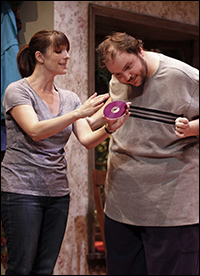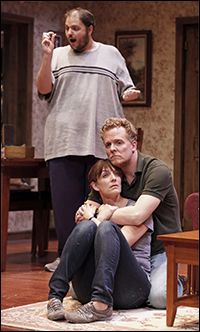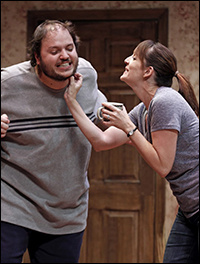
*
Many stories about children on the autism spectrum include a light at the end of the tunnel. But, what happens when the light is barely visible? In Deanna Jent's provocative new family drama, Falling, now at Off-Broadway's Minetta Lane Theatre, the playwright takes the audience into a world where every day is a struggle for a mom named Tami (played by Julia Murney) and her husband and daughter. Tami is also the mother of an autistic 18-year-old named Josh (indelibly portrayed by Daniel Everidge, who is so convincing that some audience members have thought he's on the autism spectrum). The play charts how Tami — a character slightly based on Jent — struggles to balance family life, her son's occasional violent outbursts and her sanity. When her mother-in-law pays the family a visit, the daily routine is thrown off its axis — prompting an oft-repeated discussion about the possibilities for Josh's future. What's the future for child whose aggression is proving to be a danger to those around him?
I was really looking forward to Falling. I took a friend whose adolescent daughter is severely autistic, and after the play she turned to me and said, "This is my life." Do you often get that response?
Deanna Jent: From people for whom it is their life — yes. Part of the power of theatre is telling stories that haven't been put out there in public before… I remember I was in college when the first wave of gay plays came out in the '70s and '80s; for some of my friends — for the first time — to see honestly-depicted, real people [and] not stereotypes, that was so powerful for them. I don't equate this play necessarily to that, but there's something there… It makes me realize why I do theatre — when [the show] can connect with people in that way. But hopefully, also, connect with people for whom that is not their life, [and] somehow they recognize the humanity or the situation of the family — trying to love somebody who's not easy to love.
| |
 |
|
| Julia Murney and Daniel Everidge in Falling. | ||
| photo by Carol Rosegg |
DJ: Right. Some people have said to me, "Well, aren't you afraid that people are going to leave the theatre thinking that all people with autism are like this?" And, some people say, "Well, this [play] is not going to make people think very nice things about people with autism." As humans, we're all different, and everyone with autism is different. I can't make a story about something general… It has to be about a specific [case] — that's where the truth is. You've said before that the play is based on your life. What made you want to tell your story? Was it a cathartic experience?
DJ: Well, I didn't start out actually writing a show. I'm a person who writes to sort of figure out what's going on in my life. I've always been a journaler, and I've written some non-fiction essays about parenting a child with autism. So I started just writing down some experiences when [my family] had a particularly difficult summer that's very similar to what happens in the play. And, [after] talking with some friends, they said, "Why aren't you writing a play? You're in theatre!" I said, "Well, this is my life; not a play. Plays have a beginning and a middle and an end, and I have no clue where my life is going!" And, a friend said, "Well, what if you just made these…characters."
What I really set out to do, when I decided to do it as a play, was create an experience for the audience where you sort of believe you're going down one road, and suddenly the world drops out from under you and you discover you're in a different place. That's what our lives are like. For example, I'm getting ready to do a guest lecture at one of the universities here in town, and two minutes before I'm supposed to go start talking with the class, I get a phone call from the police that the [school] bus is on the side of the road, and someone has to go pick up my son because he attacked someone on the bus. So I call and take care of that…and walk out and do my lecture. It's like having all these different experiences rolled into a day. I set out to take the audience on that ride — jump on board, and keep your hands and feet inside the car because it's going to be a bumpy ride! It's not a play about "autism awareness." If I want to teach, I'll teach. Plays, for me, are about raising interesting questions, having an experience and walking in the shoes of other people.
| |
 |
|
| Daniel Everidge, Julia Murney and Daniel Pearce | ||
| Photo by Carol Rosegg |
DJ: In the [post-show] talkbacks, it's really hard for people to accept the fact that there is no good choice. Many people in the talkbacks will say, "Of course there are places for those kids to go," and I'll say, "Well, sometimes there are, and sometimes there aren't… And, when there are, they're not always good places." What [Tami] says is real. I'm not exaggerating any of that! We want there to be a happy ending. It's hard to live in the tension of reality and still try to hang onto some hope.
[SPOILER ALERT!] Tell me about writing the sequence in which something extraordinary and shocking happens to Josh — and Tami approaches a sense of relief. Was it emotional for you to write?
DJ: Well, the whole thing was emotional for me to write. The idea of having to let go of the dream of who your child will [grow up to] be is something that came up early for me. And, like any grief issue, it still raises its head from time to time… You have these moments of, "I wish they could just be out of pain," and then you feel guilty because [you think], "Am I wishing they would be dead?" If you're dealing with a difficult child or a relative who has an addiction problem or something, you just have these human moments of dreaming — wishing — it was gone, and imagining what your life could be…and then dealing with having had that emotion. It's not something that people talk about, but I will say that many women have come up to me after the show and kind of whispered in my ear, "Thank you for putting in the dream sequence" — like it's this little shameful secret we have for some reason.
What kind of conversations did you have with Julia Murney in rehearsals?
DJ: Well, with the whole cast, I had the wonderful luxury of just being able to spend time with them early in the process [and] talk about the backstory. I just said, "This is my life. The characters are not me, but a lot of what happened to me is in here." So I offered up my experience and feelings as a starting point for them. And then I was gone enough from rehearsal so that they could find the characters and not feel like they had to somehow be imitating me or my family. I know that they talked about — both Julia and Daniel Everidge, who plays Josh — feeling like, in order to honor this story, they needed to try to make it as much like me and my son. Then, of course, [they] both realized — with the help of the director, [Lori Adams] — you take that experience, but it's you as an actor taking those things on.
| |
 |
|
| Daniel Everidge and Julia Murney | ||
| photo by Carol Rosegg |
DJ: No. "Pretend" is a concept that he doesn't understand. Many people on the autism spectrum are very black-and-white thinkers — very literal, concrete thinkers — so pretend is difficult. When we had the show in St. Louis [at the Mustard Seed Theatre], a family brought a teenage son who was on the [autism] spectrum, and they were, like most of us, prepared that it might not go well. They sat next to the exit and, of course, had a plan — the dad could take the son home if needed, and the mom could stay. Everything went fine until the first incident of violence where Josh grabs his mom's hair, and the boy got very upset and started standing up, so the dad took him right out. It didn't disrupt the show, but the dad wrote to me later — in talking to his son, he said, "What happened?" And, the son said, "Well, that boy was hurting her and no one was helping." He didn't understand, of course, that this was pretend. Theatre Development Fund has offered autism-friendly performances of The Lion King…
DJ: Our cast went to The Lion King performance. When we were in rehearsals, there was a TDF autism-friendly performance, and they went — not to see the show, but to watch the families come in. They said it was a life-changing experience for them — to watch all the kinds of families, the vast varieties of people and how joyful they were at having a place where they could come and feel accepted and enjoy themselves as a family. One of the things that I think may not be immediately clear from Falling is the sense of isolation that this family has. You can't invite friends over, and even relatives coming to visit is difficult.
Read the Playbill feature about autism-friendly Broadway performances.
(Playbill.com staff writer Michael Gioia's work appears in the news, feature and video sections of Playbill.com. Follow him on Twitter at @PlaybillMichael.)
View video highlights from Falling:


Evan-Zimmerman-for-MurphyMade.jpg)






